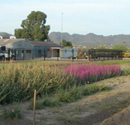As the largest organization in the world dedicated to pollinator issues, P2 provides the highest level of scientific advising and consultation services to public and private organizations. Our original investigations and collaborative efforts support pollinators and provide essential information for positive change. Find our more about our targeted efforts below.
| FIELD RESEARCH | |||
Pollinator Partnership scientists collect data on wild and managed pollinators to develop a better understanding of the status of populations in key ecological regions. Field studies help to outline priorities for conservation and management. |
Find links to original research and technical reviews developed by P2 scientists. Our published works span the disciplines of ecology, conservation and management, behavior, plant-insect interactions, and pop culture. |
||
| RESTORATION, MONITORING & MANAGEMENT | |||
Healthy habitats are the key to pollinator survival. P2 is developing habitats across North America in private gardens, on utility landscapes, on corporate lands, and on public lands. |
P2 is a leader in supporting and developing policy and conservation initiatives the protect pollinators and the ecological services they provide. Our focus on policy includes local, national, and international issues. |
||
CONSULTING & CORPORATE SUSTAINABILITY |
|||
 |
Pollinators provide essential ecological services that benefit humans, plants, and animals. Evaluating and quantifying these services helps in understanding just how valuable they are to our survival. |
P2 provides technical assistance; program support, evaluation, and monitoring; restoration services; training; and peer-reviewed assessments of policy and science to help government, corporate, and private stakeholders manage and conserve pollinators. |
|